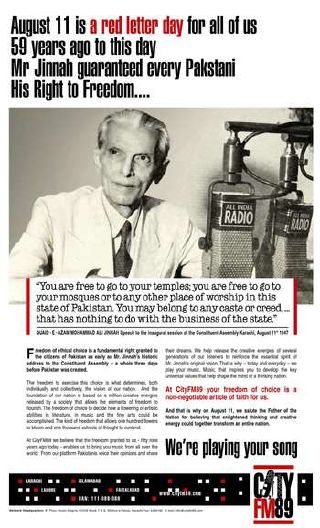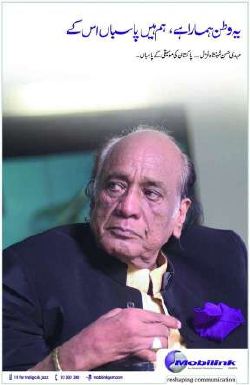Adil Najam
 What an amazingly poignant and powerful advertisement. And how timely.
What an amazingly poignant and powerful advertisement. And how timely.
Published in Dawn (11 August, 2006) as a full page ad for the radio station City FM 89 it highlights what I believe to be one of Mr. Jinnah’s most evocative and inspiring speeches. Certainly one that is most relevant to Pakistan’s present as well as future. The key quote is printed right below his photograph:
“You are free to go to your temples; you are free to go to your mosques or to any other place of worship in this state of Pakistan. You may belong to any caste or creed — that has nothing to do with the business of the state.”
Of course, his vision was not always followed. But on this, the eve of Pakistan’s Independence Day, there could not be a more timely moment to remind ourselves what the vision was.
City FM 89 also has a full day of special music planned for August 14, which by the looks of its sounds very enticing. For example, I would love to find out what their list of the ‘Top 50 Pakistani Songs’ look like. Whatever that list might look like, it is bound to have multiple entries from the incomparable Shahenshah-e-ghazal: Mehdi Hassan.
And that brings me to the second advertisement I saw, also in Dawn (12 August, 2006). This ad also spoke to my sensibilities.

First, this advert from Mobilink pays tribute to one of our greatest artists. That is something we do not do often enough; and do not do very well when we do it.
Moreover, the Urdu verse at the top — yeh watan hamara hai, hum hain pasbaan iss kay — comes from what I think is one of the most moving Pakistani national songs ever (commentary and link to the song here; more ATP posts on this here and here).
Most of song is in the ‘words’ of Mr. Jinnah so that ‘humara‘ (ours) in that line is ‘tumhara‘ (yours) in the song. But the intent is quite clear: we have to make of this country what we make of it. Even as a kid, this song always mesmerized me both for how Mehdi Hassan sang it and even more so for the words…. hum tou mehz unwaaN thay, asl daastaN tum ho!
Unlike so many other milli naghmay which were really naara baazi set to music, this one had a clear and powerful message. It seemed to me that Jinnah was saying to all of us: ‘guys, my time is up, I have done what I could, now its your turn; do the best you can and make the best of what you have.’ Of course, neither he nor the song was saying exactly that. But that is what I took from the song.
It was always a poignant song, but also an uncomfortable song. Because one always knew that we had not really lived up to the responsibility placed on us.




















































=start rant
I personally believe the creation of Pakistan was based on realpolitick of those times. However I also feel that not much debate followed after its creation, that would have gone towards forging an inclusive ideology for nationalism.
I hope I am not offending anyone, but the “islamization” done by Zia completely uprooted the saplings planted by Jinnah. Pakistan was created for Peace. I simply wish the subcontinent followed the vision of our founding fathers.
I am yet to read Aitzaz Ahsan’s book, Indus Saga. Has anyone here read it?
=end rant
Folks, I would very highly recommend that you read the post that Bhupinder has just posted on his blog under the title: “Midnight’s Children- Jawaharlal Nehru and Mohammad Ali Jinnah.
It is not just that he has very kindly mentioned this blog and post, but because it is an absolutely fascinating and deeply thought provoking comparison and analysis of
It is, however, his analysis and his conclusion that I found the most insightful. He says:
I hope I have whetted your interest enough that you will go and read Bhupider’s post in full:
http://bhupindersingh.blogspot.com/2006/08/midnigh ts-children-jawaharlal-nehru.html
Adil,
I am glad that you brought up the 11 August Speech on ATP — at an appropriate time. Of all the speeches and statements of Jinnah this one is a defining speech. Pakistan ideology, if ever there was one, is spelled out in this speech.
Politicians make all sorts rhetorical speeches and statements, sometime even contradictory, especially when they are addressing crowds. So did Jinnah, on occasions. But this was no ordinary public speech meant to arouse or quell the emotions of a crowd. Pakistan had already been achieved, a constituent assembly was in place and Jinnah was elected its president. He delivered this speech to the assembly defining his vision of Pakistan and thus giving out, if you will, his guidelines for the future constitution of Pakistan. It was a calculated and written speech from a person who, unlike most politicians of Pakistan, was very careful with words.
It is a shame that successive governments in Pakistan have tried to hide or even distort and censor this speech. No government school or college in the country displays this speech and no school textbook includes it.
It is good to know that someone thought it fit to publish this speech as a full page advertisement in Dawn.
I am sure you are aware that Oxford University Press in Karachi, a few years ago, collected all the speeches and important statements of Jinnah and published them in the form of a book. Therefore, can be happy that it won’t be easy for anyone to doctor or distort this historic and defining speech any more.
Raza: Thanks for the link to Seervai’s book. I am aware of Ayesha Jalal’s arguments and have read a critique (I think in Sucheta Mahajan’s book on Partition), though not the book itself.
I agree with you, that the question of Pakistan’s creation/ India’s partition will continue to be debated.
Aziz: Your point on Deoband is well noted. I happened to drive from Mussorie to Delhi few years ago, and while taking a short cut away from the highway, suddenly found myself in Deoband. In the few minutes that I stopped there, one could see the rather grand mosques and buildings that stood out in the otherwise typically Uttar Pradesh town- or perhaps an overgrown village. One can only conjecture that a lot of (Saudi?) money has gone there.
Msk: I see your point and can relate well with this. The case in India has not been dissimilar- specially after 1992 (demolition of Babri Masjid) and the rule from 1998 to 2004 by a coalition government headed by the Hindutva party, the BJP.
I must thank everyone who has commented here in response to my question, it has been educative and helped to understand the context of Pakistaniat from different viewpoints that are different from what I had grown up with.
Azaadi Mubarak !
Bhupinder. I don’t see any contradiction between one the one hand a (very large) minority community that considers itself socially distinct and fears the imposition from an even larger (gigantic) majority and fears that they will be drowned out in a behemoth country wanting to seek independence and on the other hand also thinking of creating a non-theological state. The irony is NOT that Jinnah wanted minority rights. The irony is that a people who KNEW what it felt like to be a minority and had created a new country precisely because they did not want to be a second class minority, so quickly forgot what it feels to be like a minority and ended up doing to its minorities precisely what it did not wish to be done to it.
So, I do not see any contradiction in this vision at all. Most countries with a single very large minority face this in one way or another. We have just not been good at dealing with it. At least one theory on this is that had Pakistan remained the much more diverse country that it would have been had non-Muslims in the Pakistan region not migrated (or if Bengal and Punjab not been divided) then the resulting more multicultural country would have been forced to deal differently with this question and those who wanted a more theocratic Pakistan (many of whom had actually been opposed to the idea of Pakistan originally) would not have gained the influence they did. This is an interesting theory but is, of course, just speculation since there is no way of knowing what would or would not have happened.